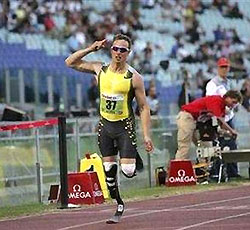LONDON - South African double amputee Oscar Pistorius appealed to the Court of Arbitration for Sport (CAS) on Wednesday against his ban from running at this year's Beijing Olympics with artificial limbs.
The International Association of Athletics Federations (IAAF) ruled last month that Pistorius could not compete against able-bodied athletes because carbon-fibre blades attached to his legs gave him an unfair advantage.
 South Africa's Oscar Pistorius reacts at the end of the men's 400-m during the Golden Gala IAAF Golden League at the Olympic stadium in Rome, in this July 13, 2007 file photo. Pistorius appealed to the Court of Arbitration for Sport (CAS) on Wednesday against his ban from running at this year's Beijing Olympics with artificial limbs. [Agencies]
South Africa's Oscar Pistorius reacts at the end of the men's 400-m during the Golden Gala IAAF Golden League at the Olympic stadium in Rome, in this July 13, 2007 file photo. Pistorius appealed to the Court of Arbitration for Sport (CAS) on Wednesday against his ban from running at this year's Beijing Olympics with artificial limbs. [Agencies] |
"I am filing this appeal not just for myself but for all disabled athletes. We deserve a chance to compete at the highest levels if our bodies permit us to do so," Pistorius said in a statement issued by the international law firm Dewey & LeBoeuf.
Pistorius, 21, had both legs amputated between his knees and ankles at the age of 11 months after he was born without fibula bones.
He has argued that the IAAF tests on his prosthetics were inadequate and said they did not give him an advantage over other athletes.
However, a report commissioned by the IAAF concluded that the prosthetics used by Pistorius gave him a significant advantage over able-bodied runners.
DEVICES BANNED
Last year, the IAAF amended its rules to ban the use of any technical device incorporating springs, wheels "or any other element that provides the user with an advantage over another athlete not using such a device".
The IAAF's ruling council agreed that Pistorius should not be allowed to run in Beijing or in any other meeting sanctioned by the sport's world governing body.
A study, carried out by Professor Peter Bruggeman at the German Sport University in Cologne, compared Pistorius with five able-bodied athletes of similar ability.
"Pistorius was able to run with his prosthetic blades at the same speed as the able-bodied sprinters with about 25 percent less energy expenditure," the report concluded.
The report said the returned energy from the prosthetic blades, known as "cheetahs", was close to three times higher than the ankle joint.
"The mechanical advantage of the blade in relation to the healthy ankle joint of an able-bodied athlete is higher than 30 percent," it added.
"It is evident that an athlete using the Cheetah prosthetic is able to run at the same speed as able bodied athletes with lower energy consumption."
Last July Pistorius ran in the 400 metres B race at the Golden Gala in Rome, finishing second. Two days later he finished last in wet conditions in Sheffield, Britain, and was then disqualified for running out of his lane.
Pistorius won a gold and bronze at the 2004 Athens Paralympics.